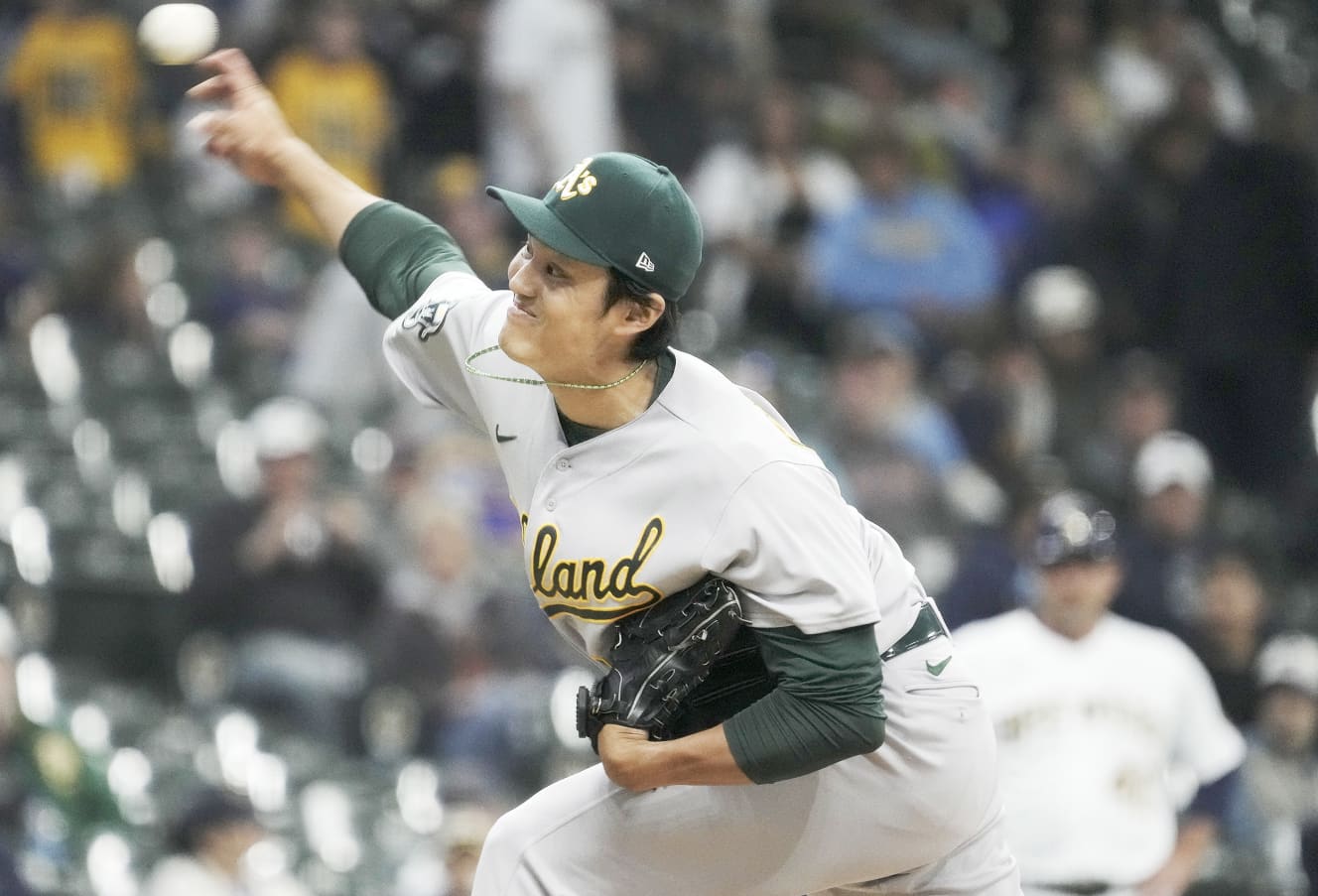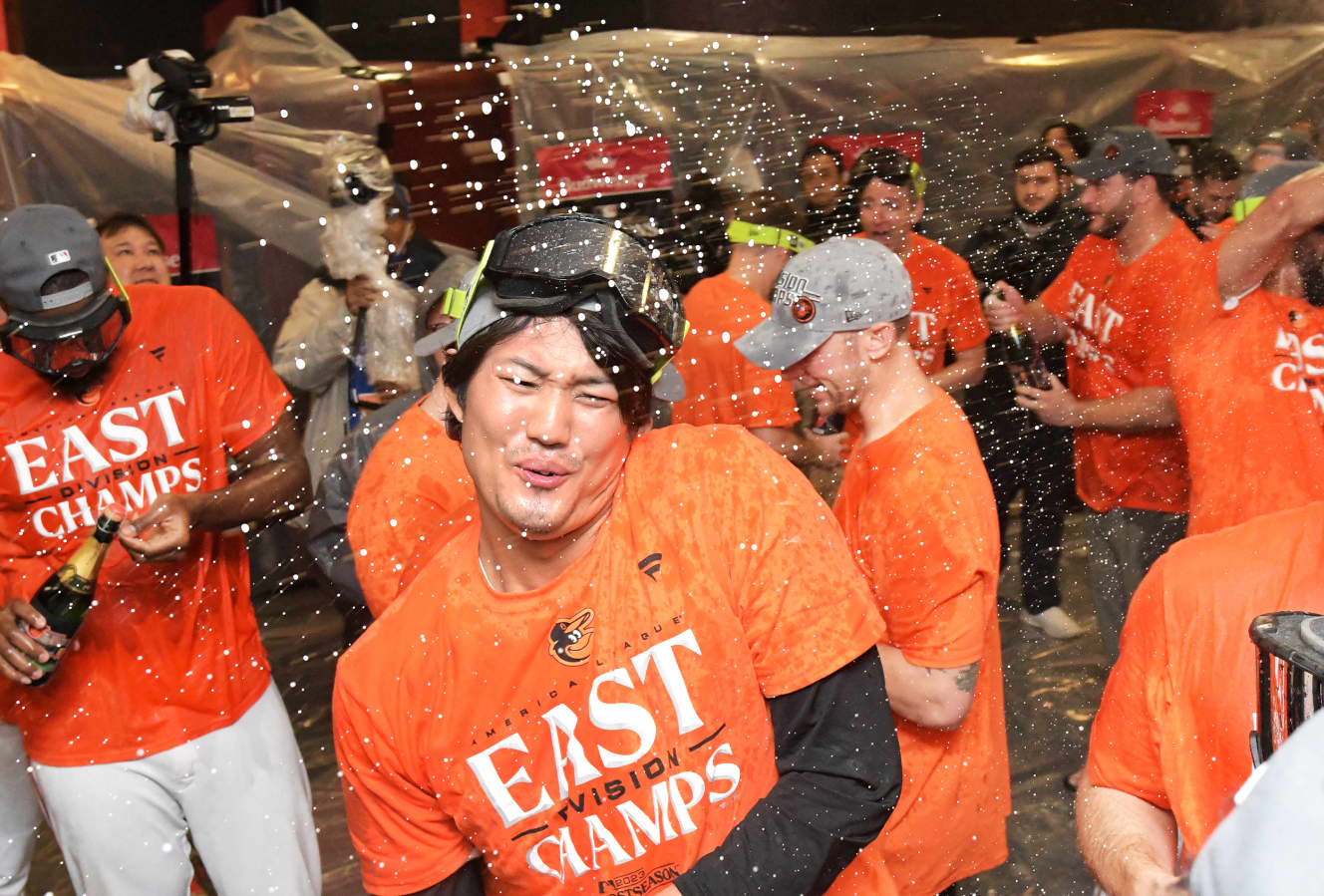Special Interview] Shintaro Fujinami reveals the secret of his awakening: “I used to hate the word ‘mental’…”
The “Worst Pitcher in Major League Baseball” will be a major contributor to the Orioles’ district championship with a barrage of fastballs reaching 160 km/h.

In a sense, failure is also a success.
That is the treasure that Shintaro Fujinami, 29, brought back from the Major Leagues this season.
When I close my eyes, I think of the mound in Milwaukee in mid-June. In a three-game series against the Brewers on the road, Fujinami pitched two relief games, allowing no hits and no runs, and recording one win and one hold.
Fujinami said, “It was right around that time that I finally gained confidence in my straight bat, or rather, my way of thinking started to change. I said to myself, ‘Just attack the strike zone more and more. If you get hit, it doesn’t matter.’ I became able to separate the two, or …….”
As he said in an interview with this magazine last offseason, he was “half confident and half anxious” going into the major leagues. After giving up eight runs in the middle of the third inning against the Angels in his first official appearance, he went on a four-game losing streak. His defensive batting average exceeded 14 runs, and he was called “the worst pitcher in MLB history.
To be honest, I was a little too defensive,” he said. My opponent was a major leaguer. If I didn’t throw hard enough on a tough course, I would get beat to a pulp.
He tried not to watch the news at all, but a friend sent him a line and informed him that he was being bashed in Japan and the United States. Still, Fujinami looked forward, knowing that he would be able to experience “how hard it is to get hit by this ball” and “how much I have to suffer” only when he took the mound in the Majors.
Fujinami’s managers, coaches, and teammates at Athletics, his team at the time, were even more positive.
They kept telling me, ‘Fuji, be confident! Fujinami’s manager, coaches, and teammates were all very positive toward Fujinami. What you lack is the spirit of self-belief.
Even when I was in Japan, I was told that there were not many guys who could throw a nasty ball over 160 km/h all the time, but in the majors, they would try to convince me by presenting data.
He showed me a heat map showing the batting average for each type of pitch and its course, and said, “The batting average for a straight ball up the middle is only 10%,” or “Even if you go low, the batting average is around 20%. I’ve never seen a pitcher with such a low strike-zone batting average! I’ve never seen a pitcher with such a low strike-zone batting average.
Even though he understood what the data meant, it took him several months to accept this bold idea.
Fujinami recalls that he learned what he needed to learn in those “months.
The majors have a positive attitude toward failure. For example, I took the mound in a pinch situation, threw more and more pitches into the strike zone, got hit hard, and got the ball back. In Japan, it would be a relief failure, but in the majors, when I return to the dugout, the pitching coach applauds me and says, “Good job! Good job!
You did what you had to do. The hitter you hit was above you. Take off your hat and show some respect! You should continue to pitch like this tomorrow.
In Japan, they would say, ‘Why did you throw a straight ball in that situation? and they would pinpoint the failure. There is something to learn from that, and it is important, but the majors have a completely different way of looking at it. It was refreshing to see how they are more proactive about mistakes and how they try to make better mistakes.
Fujinami has also changed his perception since coming to the Majors.
I hated the word “mental,”” he said. Mentality in the Japanese language refers to mental strength or weakness. It is very abstract, like whether or not you can stay strong in a pinch. However, in the majors, mentality is thinking. It is a way of thinking that allows you to focus on your best pitch.
All″ drama″.

When Fujinami took the baton at the end of the game, he had one thing on his mind: getting the first strike.
How many innings, whether there were runners on, the score difference, and the game difference are all “dramas” (……). It’s happening in a world outside of you, so it’s ‘nothing you can do about it. It’s something you don’t have to think about. Think about what you can do to increase your chances of keeping opposing hitters at bay, and focus on that.
The sports media pointed out that he had changed his grip on the ball, that he had started to use a pitch tunnel, and other technical changes, but Fujinami shook his head and said, “It’s one factor, but it’s not that simple. What he changed was his “way of thinking.
He breathed well, used the same form as usual, and got the first strike without hesitation, making the count one ball to two strikes with three pitches. By repeating the “pitching with the lowest batting average,” which is backed by data, Fujinami’s rapid ascent began.
The “Nasty” fastballs of over 160 km/h and splits of nearly 150 km/h thrown up the middle and high without hesitation made the major leaguers jump up and down. Before he knew it, he had become the winning pitcher for the Athletics.
In mid-July, after a game in which the Athletics were feeling a definite sense of confidence, they were called into the manager’s office and told by Mark Kotsay, 48, the manager of the Athletics, “FUJI, Baltimore, Baltimore.
FUJI, you will be traded to Baltimore. Pack your things today and leave first thing tomorrow.
He poured Kotzei’s favorite whiskey, which was in the manager’s office, into a shot glass, and the pitching coach, trainer, and interpreter joined him in a toast to the success of FUJI. We all clinked our glasses together.
The Orioles are in first place today. The Orioles are in first place today, and they have a shot at the World Series. Good luck,'” he shook his hand and gave him a hug and said, “I’m very happy to have been able to experience the mid-season trade. I even got to experience a mid-season trade, so it was a really intense year (laughs).
After returning to Japan in late October, Fujinami went straight to his parents’ house in Osaka. After returning to Japan in late October, Fujinami went straight home to his parents’ house in Osaka, where he toasted to his mother’s favorite dish, cabbage rolls.
In his first year in the majors, Fujinami went 7-8 with 5 holds and 2 saves. With the Orioles, he contributed to a district championship, something that Shohei Ohtani (29) had never experienced.
His acquaintances praised his efforts and congratulated him on his “triumphant return,” but Fujinami himself laughed, saying, “It’s a strange feeling.
I didn’t do well at all, and I didn’t get a good result,” he said with a wry smile. My parents didn’t mention my performance, but just said, ‘Welcome back’ (laughs). I think their honest reaction was, ‘I’m glad you were able to play without injury. As a parent, that is.
Fujinami became an FA at the end of the season and is now waiting for an offer. His agent, Scott Boras, said, “Many teams are interested.
I’m glad I made it to the majors, even though I didn’t do well enough to be proud of my performance. All of my failures have been good experiences. ‘High, wide! I was surprised at the difference in the strike zone. I was surprised at the difference in the strike zone. I think I will be able to start the next season with a certain degree of composure. I am looking forward to seeing what kind of things I will learn.
With the Osaka Toin and Hanshin teams, Fujinami says he “dared to jump into places higher than my own level and grew by struggling. Now, on the pinnacle stage of Major League Baseball, his dormant potential is coming into play.




From the December 22 issue of FRIDAY
PHOTO.: Kei Kato AP/Afro (Athletics) USA TODAY Sports/Reuters/Afro (Orioles)